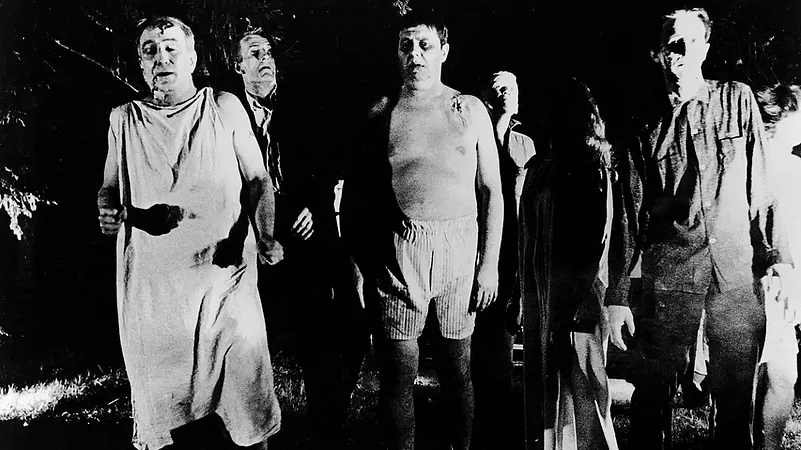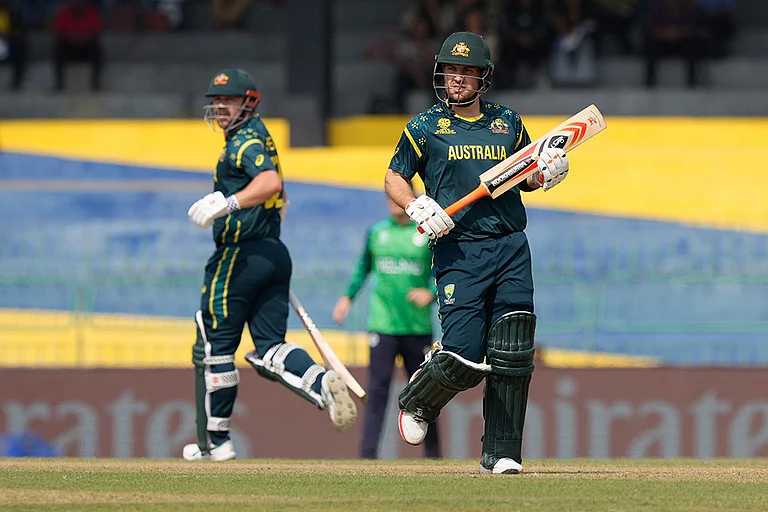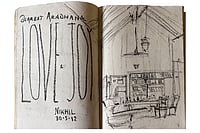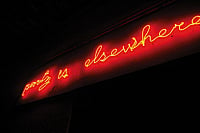Housewives forming covens as a means of survival. Stopgap police forces burning citizens to contain what they stubbornly believed was a biological agent. A young man encouraged by the chaos to play out delusions of vampirism. A troupe of renfaire motorcyclists who believed their Arthurian code could withstand any strain. A paraplegic man trapped indoors, tortured by his helper monkey, begging her to send help. Such strange tales, and Hoffmann read them over and over. One day they might remind us who we used to be, and who we tried to be, and that recollection could save the world.
—George A. Romero, The Living Dead
I no longer draw a circle with salt and sit inside it while watching horror films. Salt, people say, protects against ghosts. But we have passed through the Anthropocene. We have created “destruction means” and have imagined the dead coming out, feasting on our flesh and blood, and initiating us into their fold. On a side note, zombies should wear aprons. The blood, flesh and intestines are splashed all over their bodies. The undead don’t know sustainability. And reproduction is a tough deal during a zombie apocalypse. Of course, the zombies are brain dead. I’d say the heart’s gone too. Or whatever is that rare thing or idea called “soul”, is entirely missing from this man-made creature, born out of our imagination and all the desire and want that lurk inside of us. Even Karl Marx took note of the vampires. Thirst for labour is what Marx attributed to capital. He called it dead labour that thrives by sucking living labour. In a post-apocalyptic world, with a war playing out on our handheld screens and bodies dumped on the streets, with mindless consumption ravaging our planet, the zombies have taken over the demons and other ghosts.
All the gods have been rendered irrelevant. Zombies spill out of laboratories of want and desire for money and power. Like in Zack Snyder’s Army of the Dead released last year, where a group of mercenaries enter the quarantine zone of Las Vegas that doesn’t have only zombies walking its streets but also a group of advanced Alphas under Zeus. A zombie hierarchy is therefore introduced now in tandem with the obsession of the hierarchies in the world based on power, wealth, caste and religion. Everything that’s us is reflected in the zombie world. Alphas are organised and fast. Even intelligent. They are the next in the evolution among the undead. Perhaps you could add humanity to that. After all, the zombies are us. We have mutated. Like viruses.
It was in April 1968 that Romero came out with Night of the Flesh Eaters, as Night of the Living Dead was then called. That would change horror cinema forever. Exorcism wasn’t the solution anymore. Priests had become redundant. Horror films became a means for political and social commentary. In Night of the Living Dead, apocalypse survivor Ben is an African American and, in the end, he is killed by a gang of trigger-happy rednecks. This was the year when the assassination of Malcolm X happened. Romero had managed to capture the tumultuous chapter in American history.

The pandemic has seen a rise in the horror film market. Ours is an allegorical age. The undead are allegorical characters who represent abstract ideas and are stories in their own right. Monsters are used to represent more terrifying real people. And monsters are born because society has no space for them. We create them, we become them. There is an insistence on apocalypse. Apocalypse is also a religious idea rooted in your doomsday tales. We only have to scan the pages of newspapers or scroll social media. Bodies in a river could be a classic trope for horror films. We have seen that. The Ganges turning into a carrier of corpses. We have come too far in the apocalyptic landscape to turn back. These films are manifestations of deep societal fear. The fear of the other, the conflicts within us, outside of us and the environmental hazards.

***
“It’s the same old theme, since 1916
In your head, in your head, they’re still fighting
With their tanks and their bombs and their bombs and their guns
In your head, in your head, they are dyin’
–Zombie by The Cranberries
(After an IRA attack that resulted in the death of two children, The Cranberries wrote Zombie in 1994. The question they posed to the extremists was: “What’s in your head?”)
ALSO READ: The Ghost As A Metaphor In Bengali Cinema
I have seen the world collapse, go up in flames and the high rises crumbling like cookies and innards of humans and animals strewn across the landscape as hordes of zombies walk the earth in search of human flesh. Zombies, a more scientific version, are constructs of the human imagination. Perhaps the makers were aware of rampant consumerism, patriarchy, abandonment and all the other ills that plague us. It is all an inheritance of loss. Death is not redemption at all if you turn into one of the undead. We have turned into monsters. There have been too many wars in my lifetime. The visuals in the films perhaps derive their destruction images from the wars. There is a war in another country. There is a man who has taped his windows and who is alone in his building with his cat and his dog somewhere in Ukraine. I want to see him wave at the world and say that the war happened and he survived it, that his windows are intact and his cat and dog are looking out of it at a city that never succumbed. That’s what watching horror films gives you. A thin line of hope. People have survived such apocalypses. And have figured out ways to survive. That image of a man taping his windows to escape the bombing immortalised in a poem by someone who posted it on Twitter reminds me of the scenes where men and women tape their windows to become invisible to the monsters. Birdbox is one such film. In the 2020 film called The Quiet Place, mysterious creatures hunt by sound. That’s a political statement. Censorship and surveillance are routine methods employed by the governments. You speak out and you are hunted.
ALSO READ: The ‘Spirit’Of Filmmaking

The cultural matrix has a definition of evil. Horror falls under the “other” category, an undefined place. It is all about the presence of the wrong in us, the fight within us. As the Cranberries sang – In your head. It was Bram Stoker’s 1897 novel Dracula and Tod Browning’s 1931 Universal adaptation of a count that feeds on other humans that first struck as a parable of the ills of capitalism reflected in Count Dracula’s bloodlust. “We become as him. We henceforward become foul things of the night like him—without heart or conscience, preying on the bodies and the souls of those we love best,” Mina Harker writes in her journal in the novel. The bite-victim transforms into a bloodsucker, a consumer. That metaphor of the vampire has now found another version. The living dead, the walking dead, the zombie, the Alphas, etc.
ALSO READ: Resident Evil: The Zombie Apocalypse In Goa

Real-life horror of our times is perhaps what’s triggering all these apocalyptic narratives where zombies mutate, collectivise and devour. The replication can only be avoided by mobilising and forming friendships. By forming collectives, looking out for each other and that whole idea about togetherness. We are in a trial stage of a grand horror being played out. We must not think and only kill. Wars, riots, this and that. In that sense, we are acting as reanimated corpses. Visuals of deaths, bombings and nuclear war as final solution in such films have made us used to this blood and gore. There is a threat of a nuclear war. Two great wars weren’t enough. We don’t learn easily. We need to remember who we were, as Romero said. That could save us. Neither god nor religion. Not even money.
The current issue of Outlook looks at horror and its various manifestations and the politics of horror.
(This appeared in the print edition as "It is Us")
ALSO READ


























